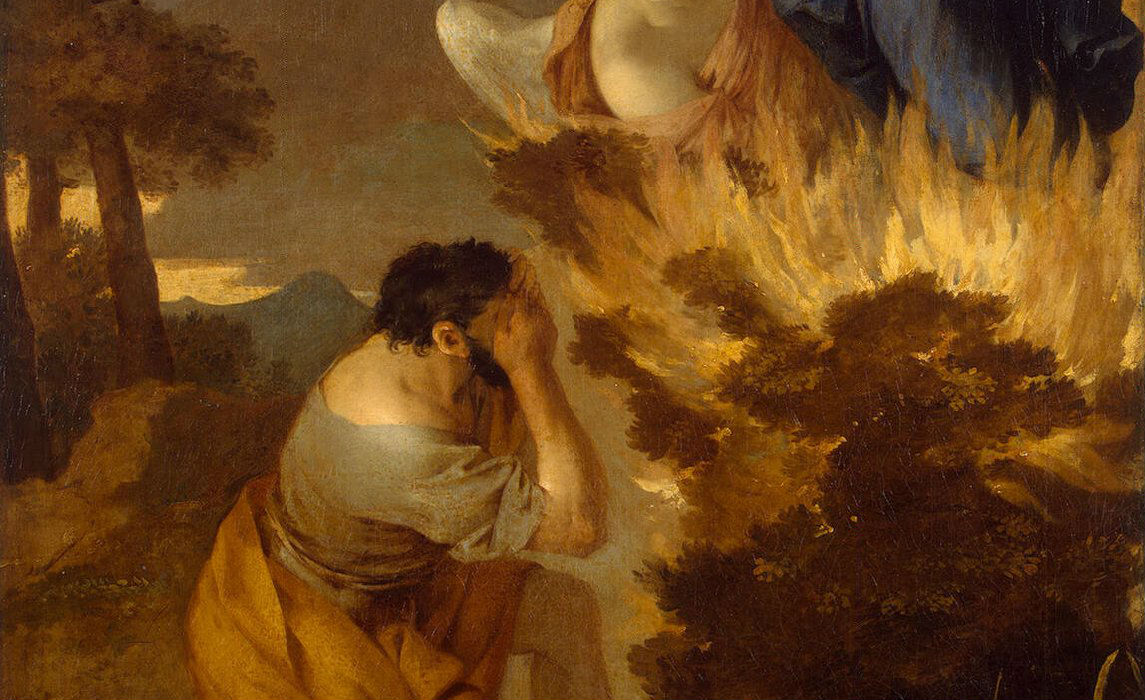
From Burning Bush by Sébastien Bourdon, 17th century. Wikipedia.
In the third chapter of the book of Exodus, God speaks to Moses at the burning bush, commanding him to return to Egypt, confront Pharaoh, and initiate the rescue of the enslaved Israelites. “I will be with you,” He assures Moses; “and that shall be your sign that it was I who sent you.”
Seeking greater confidence in his mission, Moses presses further:
When I come to the Israelites and say to them, “The God of your fathers has sent me to you” and they ask me, “What is His name?,” what shall I say to them?
To this, God offers a famously enigmatic response: “Ehyeh-Asher-Ehyeh,” a phrase variously translated as “I am who I am” or “I am that I am” or “I will be who [or: what] I will be.”
What is most surprising about this incident is not the exchange itself or even God’s gnomic response to Moses’ question. It is that, having elicited the name by which to introduce God to the Israelites, Moses never once invokes it, either here or anywhere else in the Torah. He never says to the people: “Ehyeh-Asher-Ehyeh sent me.”
A long history of interpretation surrounds God’s answer. The great medieval commentators, including Abraham ibn Ezra (1089-1167) and Moses Naḥmanides (1194-1270), offer long, detailed, and sometimes contradictory explanations of the grammar, the meaning, and the full import of the phrase “Ehyeh-Asher-Ehyeh.” Philosophers weigh in with guesses about time, futurity, determinism, and free will. But the mystery of Moses’ silence persists.
Denigrators of religion often accuse it of claiming unwarranted knowledge of things one cannot know. But in fact it is religion, not secular teaching, that posits an essential unknowability at the heart of the universe. The world is not a puzzle—something susceptible of rational explanation—but a mystery, profound and ultimately unfathomable. In order to know God, as the medieval philosopher Joseph Albo said, I would have to be God.
This is the Socratic principle applied to faith: whereas less penetrating intellects than Socrates were certain that they apprehended the truth, he was wiser: he understood his ignorance. The paradox of mystery is that the more one knows, the more clearly one sees, the more impenetrable the mystery.
Moses’ reluctance to use God’s name can thus be viewed as a deep philosophical statement, an early religious epistemology. God in the Jewish tradition never takes an “intelligible” form, as does Jesus in Christian doctrine. God is reachable, but unknowable. The greater your understanding of God, the more pronounced is your ignorance.
In the Jewish tradition, Moses himself has the clearest and most intimate knowledge of God: “never again,” we read at the very end of the Torah, “did there arise in Israel a prophet like Moses—whom the Lord singled out face to face” (Deuteronomy 34:10). Yet the tradition also understands this seeming familiarity in a way consistent with its assumption about God’s transcendence. Commenting on the rabbinic statement that all the prophets saw through a glass darkly but Moses saw through a “lucid speculum,” Rashi (1040-1105) remarks: “All the prophets looked through a dark glass, and thought they saw; Moses looked through a clear glass, and knew he had not seen God’s face” (Yevamot 49b).
The religious way is the via negativa, and the summit of religious awareness is the cloud of unknowing, as an anonymous medieval Christian mystic titled his work. Closer to our own day, concluding his great Tractatus Logico-Philosophicus, Ludwig Wittgenstein wrote: “Whereof one cannot speak, thereof one must be silent.” Wittgenstein’s silence is the silence not of the valley but of the summit: the point reached through the arduous search to express what can be said. The defining quest of the believer is to reach that same almost mystical endpoint.
And Moses? Moses is not only a prophet but a leader, and the former slaves being led by him are agitated, querulous, fearful, unprepared for freedom, and, as we see later in Exodus with their worship of the golden calf, incapable of apprehending an abstract, unseen God. Enigmas are the last thing they need. Moses himself may have needed to hear the mysterious name, but what the people of Israel need is God’s strong hand and outstretched arm.
So Moses solicits a name, but keeps it to himself. He has begun to develop a closeness to the unknowable God; as the wanderings of the Israelites proceed, he will become more and more familiar with God’s ways—but never with God’s essence. And Israel will follow Moses, who exhibits humility before the great inscrutable mystery that is ushering them through the wilderness.
